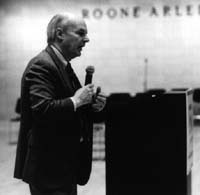America: On the Net Discusses the Future of the Internet
The Internet Policy Institute (IPI) wants to know how you think the Internet should be governed, and they came to Columbia University earlier fall this to find out.
It was the third of eight town hall meetings called "America: On The Net," being held in Universities and community centers across the country. It was sponsored by the IPI, a non-partisan research and lobbying group based in Washington, D.C. that started in Atlanta in September. The forums will culminate in a meeting with policymakers and the president-elect in December.
Hosted by the Institute of Learning Technology (ILT) and held in Columbia's Lerner Hall, the forum brought together a diverse group of students, IPI board members, academics, business leaders, and other community members.
Professor Robert McClintock, TC professor, IPI board member and head of ILT, kicked off the event. "This is an opportunity to probe our views over the need, directions, and future of the Internet in our lives," he said. "A variety of American cities and communities are being asked to articulate what it is the Internet can and should be able to help accomplish in their lives."
The open forum was bereft of any speeches, and its only agenda-to provide a dialog about the Internet's future-was moderated by Wall Street Journal columnist Kara Swisher. She opened the forum by presenting a set of questions concerning privacy and security, the Internet and society, and the digital divide of access to technology.
Questions and comments from participants ran the gamut from deciding whether the government can and should regulate the Internet to the topics of hate speech and privacy. One audience member expressed concern about dual standards in regards to private information, "There is a misguided notion of what privacy can be shared. Corporations can keep their information private but personal privacy is traded." An example was made with the case of a database of former cult members being bought out from a failing Internet company by a major cult organization.
Other topics included the concentration of broadband service providers, electronic voting, laptop giveaway programs in schools, and how to provide access to the Internet to everyone. Audience members voiced concern over the US Government's e-mail snooping device "Carnivore," how to reach the portion of the world that is illiterate, and what to do about advertisements on the Web in schools. The forum lasted approximately two hours.
"I was gratified by the range of different groups and opinions represented by the audience and participants," said McClintock, "and was struck by how articulately expressed the different views were."
He added, "The Internet Policy Institute fills something of a vacuum as most groups addressing questions of Internet policy have a special interest to advance. IPI is seeking to inform policy formation by trying to sound out the general public on their concerns and to generate public policy studies of key issues aimed at providing policy makers with full and solid information. IPI does not lobby for any particular policy position, but seeks to provide better information for use in the policy making process."
IPI president Kimberly Jenkins said, "We're standing at an important crossroads in this first year of the new millenium. Many rules of the Internet will be determined during the next four years. As the president-elect and policymakers address the issues impacting the future of the Internet, they will need to understand the thoughts and concerns of the American people-and we will deliver them."
The December national summit will be available to the public via Internet broadcast at Yahoo! Broadcast (http://broadcast.yahoo.com).
Published Tuesday, Sep. 18, 2001
